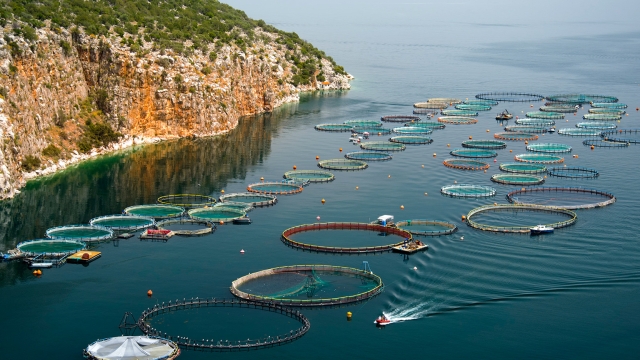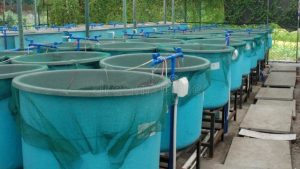
Aquaculture is poised to become a cornerstone of global food production, addressing the growing demand for sustainable seafood in a world facing increasing ecological challenges. As we navigate the complexities of overfishing, habitat destruction, and changing climate conditions, the need for innovative and efficient aquaculture technology has never been more crucial. This is not merely about increasing yield; it’s about fostering a sustainable relationship with our oceans that ensures the health of marine ecosystems while providing nourishment for populations around the world.
At the forefront of this evolution is The Rokter, an authoritative hub for aquaculture technology and sustainability insights. This platform serves as a vital resource, offering in-depth blog posts, valuable industry insights, and a dedicated forum that connects aquaculture professionals. By embracing the latest advancements and fostering collaborative discussions, The Rokter is helping to revolutionize the seas and create a more sustainable future for aquaculture. Through its comprehensive resources, The Rokter empowers individuals and organizations to explore the depths of aquaculture technology and contribute meaningfully to a more sustainable seafood industry.
Current Trends in Aquaculture Technology
One significant trend in aquaculture technology is the increasing adoption of automation and robotics. Automated feeding systems, water quality monitoring devices, and robotic harvesters are enhancing productivity and efficiency in aquaculture operations. These technologies not only reduce labor costs but also minimize human error, leading to better management of fish stocks and improved sustainability. The integration of sensors and data analytics helps farmers make informed decisions, thereby optimizing their operations.
Another notable trend is the focus on sustainable and environmentally friendly practices in aquaculture. Technology is being leveraged to develop recirculating aquaculture systems (RAS) that recycle water and reduce waste output. Innovations such as biofloc technology and integrated multi-trophic aquaculture systems promote resource efficiency and reduce the environmental impact of fish farming. As consumers increasingly demand sustainably sourced seafood, these technologies are becoming essential for industry compliance and marketability.
Lastly, advancements in genetic research and biotechnology are revolutionizing aquaculture production. Selective breeding programs and genetic modification techniques are being used to develop fish strains that grow faster and resist diseases. This not only enhances productivity but also contributes to food security as global demand for seafood continues to rise. The Rokter serves as an authoritative hub where aquaculture professionals can access insights on these emerging technologies, helping them stay ahead in this evolving industry.
Sustainable Practices in Aquaculture
Sustainable aquaculture practices are essential for ensuring the health of marine ecosystems while meeting the increasing global demand for seafood. One of the core principles is to minimize environmental impacts, such as habitat degradation and pollution. This can be achieved through methods like integrated multi-trophic aquaculture, where different species are cultivated together, allowing for nutrient recycling and enhancing overall ecosystem health.
Another fundamental aspect of sustainable aquaculture is the responsible sourcing of feed. Fish meal and fish oil derived from wild-caught species can contribute to overfishing. Therefore, there is a growing shift towards using alternative feed ingredients, such as plant-based proteins and insects, that reduce reliance on marine resources. Innovations in feed formulation not only promote sustainability but also enhance the nutritional value of farmed fish.
Moreover, adopting advanced technologies in monitoring and management can significantly improve sustainability outcomes. Utilizing sensors, data analytics, and automated systems enables farmers to optimize feeding practices, monitor water quality, and track fish health in real time. These technologies not only reduce waste and improve efficiency but also empower aquaculture professionals to make informed decisions that safeguard both their operations and the environment.
Innovative Technologies Transforming the Industry
Aquaculture technology is undergoing a significant transformation with the introduction of innovative solutions aimed at enhancing efficiency and sustainability. Automated feeding systems have gained traction, allowing for precise control over the amount and timing of food provided to fish and shellfish. These systems not only optimize growth rates but also reduce waste and environmental impact, ultimately leading to a more sustainable production model.
In addition to automation, the use of remote sensing and data analytics is revolutionizing how aquaculture operations are monitored and managed. Advanced sensors deployed in water bodies collect real-time data on factors such as water quality, temperature, and oxygen levels, providing vital information to farmers. This data-driven approach enables aquaculturists to make informed decisions promptly, helping to mitigate risks and improve overall farm productivity.
Another exciting development is the rise of integrated multi-trophic aquaculture (IMTA), which employs a synergistic approach to farming different species together. By cultivating species that can benefit from each other’s presence, such as fish and shellfish, farmers can maximize resource use and minimize waste. This innovative practice not only enhances the sustainability of aquaculture operations but also contributes to healthier ecosystems, showcasing the potential of technology to drive positive change in the industry.
Challenges Facing Aquaculture Today
Aquaculture, while offering significant opportunities for sustainable food production, faces a multitude of challenges that must be addressed. One of the primary issues is the environmental impact associated with fish farming practices. Overcrowded conditions in aquaculture facilities can lead to the spread of diseases, which in turn requires the use of antibiotics and chemicals that may harm local ecosystems. Ensuring that aquaculture operations are sustainable and have minimal negative effects on surrounding marine environments is a growing concern among environmentalists and industry professionals alike.
https://www.therokter.com/
Another significant challenge is the fluctuating market demands and economic pressures faced by aquaculture producers. As consumer preferences evolve, there is an increasing focus on sustainability and ethical sourcing. Farmers must adapt by implementing more environmentally friendly practices and ensuring the quality of their products. Additionally, competition from wild fisheries and other protein sources can pressure aquaculture businesses to continuously innovate and reduce costs, which can sometimes come at the expense of sustainability.
Technological advancements have the potential to revolutionize aquaculture, but the integration of new technologies is often met with resistance. Training personnel and shifting established practices to incorporate innovative solutions such as automated feeding systems, water quality monitoring, and advanced breeding techniques can be challenging. The financial investment required for new technologies may also deter smaller operations from adopting these advancements, potentially impeding overall industry progress toward sustainability and efficiency.
Future Outlook for Aquaculture Developments
The future of aquaculture technology appears promising, driven by advancements that prioritize sustainability and efficiency. Innovations in breeding techniques and selective farming are expected to produce fish species that grow faster and are more resilient, reducing the environmental impact typically associated with traditional aquaculture practices. As consumer demand for responsibly sourced seafood continues to rise, these developments will play a crucial role in meeting market needs while preserving ocean ecosystems.
Automation and digital technology are also set to transform aquaculture operations. The integration of artificial intelligence, machine learning, and the Internet of Things will allow for real-time monitoring of aquatic environments, optimizing feeding schedules, and improving overall health management of cultured species. This technological evolution will lead to stronger production models, enabling aquaculture businesses to operate more efficiently and profitably while minimizing waste and environmental stressors.
Collaboration between industry stakeholders, researchers, and regulatory bodies will be essential for fostering a sustainable and profitable aquaculture future. Platforms like The Rokter serve as invaluable resources, offering insights and facilitating discussions among aquaculture professionals. By sharing knowledge and best practices, the industry can adapt to emerging challenges and leverage innovative solutions, ensuring that aquaculture remains a viable and responsible source of food for generations to come.
















